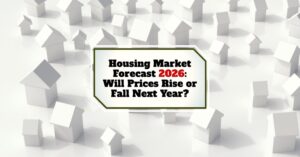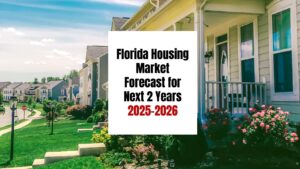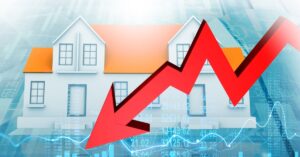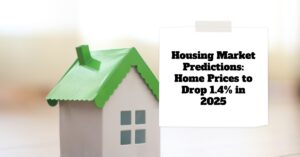Are you keeping a close eye on the housing market? The National Association of Realtors (NAR) recently shared their forecast, and it looks like they're predicting a 3% growth in national median home prices in 2025. In short, while the market has seen some ups and downs lately, experts at NAR believe home prices will see a modest increase next year.
Housing Market Boom Predictions for 2025 and 2026 by NAR
Now, I know what you might be thinking. We've seen some pretty wild swings in the housing market over the past few years. Interest rates have gone up, and for a bit, it felt like things might really cool down. But according to NAR Chief Economist Lawrence Yun, a “nuclear crash” in home prices isn't on the horizon. Speaking at a recent Realtors Legislative Meetings event, Yun pointed to a few key reasons why he expects this moderate growth.
Why the Optimism? Digging Deeper into the NAR Forecast
It's never enough to just hear a number, right? We want to know the “why” behind it. Yun's forecast for this 3% median home price increase in 2025 isn't pulled out of thin air. It's based on a combination of factors that he anticipates will shape the market in the coming year. Let's break down some of the key elements of his prediction:
- Anticipated Rebound in Home Sales: Despite a slower start to 2025 than initially expected, Yun believes that both existing-home sales and new-home sales will pick up steam. His forecast suggests a 6% increase in existing-home sales and a significant 10% jump in new-home sales compared to 2024. This increase in activity can naturally put some upward pressure on prices.
- Easing Mortgage Rates: This is a big one. For many potential homebuyers, mortgage rates are the make-or-break factor. Yun is predicting that mortgage rates will ease to around 6.4% by the end of 2025. This slight decrease from the higher rates we've seen could make buying a home more affordable for some, drawing more buyers into the market. As someone who remembers the impact of fluctuating interest rates firsthand, even a small dip can make a real difference in monthly payments.
- Continued Job Growth: A healthy economy often translates to a healthy housing market. NAR's forecast also includes an expectation of 1.6 million new jobs being added to the economy in 2025. More people with jobs generally means more people with the financial stability to consider buying a home.
- Low Levels of Distressed Sales: One of the biggest fears after a housing downturn is a flood of foreclosures driving down prices. However, Yun highlights that serious mortgage delinquencies remain low. This suggests that most homeowners are in a good position to continue paying their mortgages, reducing the likelihood of a large number of distressed properties hitting the market and significantly impacting prices negatively.
The Missing Piece: The Mortgage Rate Puzzle
As Yun himself pointed out, “The mortgage rate is the magic bullet, and we are just waiting and waiting as to when that could come down.” This really resonates with me. We've seen that even though other economic factors might be in place, higher mortgage rates can act as a significant barrier for potential buyers. The pace and extent to which these rates actually decrease will be crucial in determining if NAR's sales forecast, and consequently the price growth, materializes.
Inventory Still a Key Factor
While the NAR forecast focuses on price growth, it's impossible to ignore the ongoing issue of housing inventory. Realtor.com Chief Economist Danielle Hale, speaking at the same event, highlighted that the nation faces a housing shortage of nearly 4 million homes. In my opinion, this persistent undersupply is a fundamental factor supporting price stability and even modest growth in many markets. If there aren't enough homes to meet demand, prices are less likely to plummet.
Hale also brought up an interesting point about newly built homes often having slightly lower interest rates due to builder incentives. This is something potential buyers should definitely keep in mind. Sometimes exploring new construction can offer a bit of an edge when it comes to financing.
My Two Cents: A Cautiously Optimistic Outlook
Based on the NAR data and my own observations of the market, a 3% price growth in 2025 seems like a reasonable and cautiously optimistic prediction. The anticipated easing of mortgage rates and continued job growth are definitely positive indicators. However, the actual trajectory of mortgage rates remains the biggest uncertainty. If rates stay stubbornly high, the predicted rebound in sales might not be as strong, which could temper price growth.
Furthermore, the housing market is hyper-local. What's happening nationally might not perfectly reflect what's going on in your specific city or town. Local economic conditions, inventory levels, and buyer demand will all play a significant role in determining price movements at the local level.
What Does This Mean for You?
- For Potential Buyers: Don't panic about a sudden price surge, but also don't necessarily expect significant price drops. Keep a close eye on mortgage rate trends. If rates do start to come down, it could be a good time to jump into the market, but be prepared for potential increased competition. Explore all your options, including new constructions that might offer rate incentives. And as Danielle Hale wisely advised, shop around for a mortgage – it can really save you money in the long run.
- For Current Homeowners: A modest price increase is generally good news for your home equity. However, remember that real estate is a long-term investment. Don't make rash decisions based on short-term forecasts.
- For Sellers: If you're planning to sell in 2025, the forecast suggests a potentially more active market with modest price growth. However, it's still crucial to price your home competitively based on local market conditions.
Final Thoughts
Predicting the future of the housing market is never an exact science. There are so many interconnected factors at play. However, the latest forecast from the National Association of Realtors provides a valuable insight into what the experts are expecting. While a 3% price growth in 2025 might not be earth-shattering, it suggests a degree of stability and continued moderate appreciation in the housing market. As always, staying informed about your local market and understanding the broader economic trends will be key to making informed decisions.
Plan Ahead with 2025-2026 Housing Market Insights
The housing market is shifting—some regions are cooling while others remain resilient. Stay ahead of national trends by focusing on stable investment areas with long-term growth potential.
Norada helps investors like you discover turnkey real estate opportunities in cities forecasted for strong performance in both 2025 and 2026.
HOT NEW LISTINGS JUST ADDED!
Talk to a Norada investment counselor today (No Obligation):
(800) 611-3060
Also Read:
- Housing Market Predictions: Home Prices to Drop 1.4% in 2025
- Housing Market Alert: Over 600 Metros Will See Prices Decline by 2026
- 12 Housing Markets Set for Double-Digit Price Decline by Early 2026
- Real Estate Forecast: Will Home Prices Bottom Out in 2025?
- Housing Markets With the Biggest Decline in Home Prices Since 2024
- Why Real Estate Can Thrive During Tariffs Led Economic Uncertainty
- Rise of AI-Powered Hyperlocal Real Estate Marketing in 2025
- Real Estate Forecast Next 5 Years: Top 5 Predictions for Future
- 5 Hottest Real Estate Markets for Buyers & Investors in 2025
- Will Real Estate Rebound in 2025: Top Predictions by Experts
- Recession in Real Estate: Smart Ways to Profit in a Down Market
- Will There Be a Real Estate Recession in 2025: A Forecast
- Will the Housing Market Crash Due to Looming Recession in 2025?
- 4 States Facing the Major Housing Market Crash or Correction
- New Tariffs Could Trigger Housing Market Slowdown in 2025
- Real Estate Forecast Next 10 Years: Will Prices Skyrocket?











